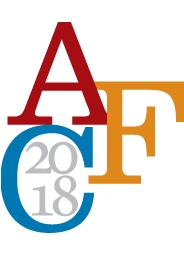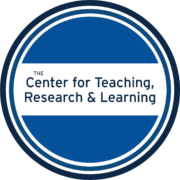The 29th Annual Ann Ferren Conference
The 2018 Ann Ferren Conference on Teaching, Research, and Learning was held on January 12, 2018, in the Mary Graydon Center at American University.
Schedule of Events
- Registration and Breakfast (8:00AM)
- Morning Plenary (8:30AM – 9:15AM)
- Session One (9:30AM – 10:45AM)
- Session Two (11:00AM – 12:15PM)
- Lunch Plenary (12:30PM – 2:30PM)
- Facilitated Discussions (2:30PM – 3:30PM)

Session One (9:30AM – 10:45AM)
101: Exploring iGen and Generation Z: Implication for Teaching
Marianne Thomson (Academic Support and Access Center), Traci Callandrillo (Counseling Center), Lara Schwartz (SPA-GOVT), Simon Nicholson (SIS), and Michelle Espinosa (Office of the Dean of Students)
Watch the video recording of this session
Generation Z (iGen) broadly defines the majority of our student body. They differ from Millennials in how they interact with the world, obtain information, and share their thoughts. This session will introduce participants to what these students have to offer our classrooms, workshops, meetings, and campus. Attendees will work together to develop pedagogical approaches to enhance the learning and harness the talents of this next generation of students.
102: Inclusive Pedagogies: Universal Design and International Students
Nikhat Ghouse (Library), Lauren Sinclair (SPExS), Joseph Mortati (KSB-ITEC), and Angela Dadak (CAS-LIT)
Universal Design for Learning (UDL) challenges us to create our courses so that we maximize the learning of all students. At AU, this challenge is further complicated by our globally diverse student population. At this session, faculty from across campus will share UDL strategies they use to address pedagogical techniques that improve learning for all students in the course, with particular attention to inclusion of international students and English language learners.
103: Mindfulness in Education: Authentic Teaching & Learning
Elissa Margolin (CAS-HS), Deborah Norris (CAS-PSYC), and Aurora Hutchinson (CAS-PSYC)
Given the challenges faced in academia today, mindfulness practices are providing many solutions. Learn the role of mindfulness to: inspire more authentic, present teaching; create more meaningful connections in the classroom; enhance values of tolerance and inclusiveness; alleviate stress; and improve pedagogical processes and outcomes. Experience practical tools that you can implement for yourself and your students.
104: Caring About Equity: Changing Expectations for Faculty-Student Mentorship
Lauren Weis (CAS-PHIL) and Cara Okopny (CAS-CRGCS)
As we make gains toward a more equitable, inclusive, and diverse university, how do changing student needs restructure faculty-student mentoring? Students increasingly require more care and attention in order to succeed academically. This interactive session discusses emerging demands on faculty to mentor 21st century students, and strategies to address how and why care roles are often distributed inequitably among faculty.
105: Cross-Disciplinary Insights into Transformational Mentoring
Mindelyn Anderson (SPExS), Olatokunbo Fashola (SOE), and Meredith Burnett (KSB-MGMT)
Watch a video recording of this session
There are many forms of mentorship, depending on contexts and field of expertise, including individual and institutional, informal and formal, and internal and external types of mentorship. This session will provide evaluation, research, and experiential insights into a diverse range of mentoring relationships, with a particular focus on highlighting the characteristics of transformational mentorship.
106: Our Common Grounds: AU Arboretum and the Airlie Center
Kiho Kim (CAS-ENVS), Michael Mastrota (Facilities Management), Charles Smith (Auxiliary Services), and Stephanie Destefano (Facilities Management)
Watch a video recording of this session
AU’s Arboretum and the recently gifted Airlie Center are tremendous resources for teaching, research, and service. Join us to learn how the campus Arboretum and Airlie have been utilized in the past and participate in planning for how they might be used in the future.
107: Immigration and Peace: Critical Issues in the Classroom and the Community
Robin Adams (Center for Community Engagement and Service), Marcy Campos (Center for Community Engagement and Service), Barbara Wien (SIS), Ludy Grandas (CAS-WLC), and Diana Guelespe (University of Maryland)
Watch a video recording of this session
One of the challenges facing universities today is how to ensure that students connect the theories they study with current day concerns. This session shares examples of high impact programs that address the challenges immigrant adults face and peace education for DC youth. They demonstrate how students, faculty, and staff can address social issues through activism, advocacy, service, and community-based learning. We explore ways to build strong community collaborations and how this work bridges differences related to class, race, language, and ethnicity.
108: I-CORPs, Incubator, Innovation, Oh My!
Kathryn Walters-Conte (CAS), William Bellows (KSB-MGMT), and John Bracht (CAS-BIO)
Watch a video recording of this session
Come learn about some of the new and exciting multidisciplinary innovation education programs promoting science and technology entrepreneurship at AU. Faculty and students obtaining entrepreneurship training and funding in the NSF I-CORPS program at AU and venture teams continuing to develop products in the AU Center for Innovation are some examples of how technology entrepreneurship training provides 21st century skills for students and faculty through an exciting experiential learning opportunity.
109: Hacking New Tech for Student Engagement
Jeremiah Patterson (SOC) and Stef Woods (CAS-CRGCS)
Watch a video recording of this session
Snapchat, chat bots, Trello, WordPress, Facebook Live—these emerging tools can actually help us teach and help our students learn. This session takes a broad look at how we might use digital tools and platforms to augment our classes and increase student engagement. It’s not about relying on these tools, but rather how to incorporate them to enhance learning in and out of the physical classroom.
110: Arabic and Hebrew Meeting Through Digital Edutainment
Abeer Aloush (CAS-WLC)
Watch a video recording of this session
This multi-sensuous engagement project is a new approach to learning Arabic and Hebrew for the purpose of Conflict Resolution and Peace Studies. The methodology expands the experience of personal growth through requiring conscious reflection on language by trying to push the boundaries of gaming; it reveals a cultural connotation of people meeting, especially in that that these languages derive from the same origin: Semitic languages.
Session Two (11:00AM – 12:15PM)
201: Creating the Engaged Classroom
Chris Palmer (SOC), Cathy Schaeff (CAS-BIO), and Katharina Vester (CAS-HIST)
In this session, we investigate how to develop an interactive and engaged classroom. This process starts with an awareness of one’s personality, teaching style, and the type of class. We also must ascertain and own our line regarding faculty/student responsibilities. We will identify the qualities of an interactive classroom and explore appropriate techniques for encouraging our students to actively engage in their own learning.
202: Infusing Diversity and Inclusion into Our Courses and Writing Center Praxis
Neisha-Anne Green (Writing Center), Caron Martinez (KSB), Wanda Wigfall-Williams (SIS), and Naomi Moland (SIS)
Watch a video recording of this session
Our AU students say that too many class readings and assignments “miss a teachable moment” or “limit how much we see ourselves” in the academic conversation by not including scholars or experts of color in class materials. In this workshop-style session, participants should bring their course plans and syllabi to learn about curricular choices that are effective while being socially and academically just. Faculty from across campus will share their approaches and discuss how working with our Writing Centers with these values in mind results in process-oriented, critical, and content-rich student learning.
203: How Do We Teach Habits of Mind?
Cindy Bair Van Dam (CAS-WSP), Brad Knight (AU Core), Lacey Wootton (CAS-WSP), and E. Andrew Taylor (CAS-PERF)
Watch a video recording of this session
Many of us are curious about the concepts behind “Habits of Mind.” This session—a teaser for faculty development in the coming year—will briefly introduce theories behind inquiry-based learning and learning transfer. Most of the conversation-based session will focus on assignment design and sequencing, classroom delivery methods, and the “habits of mind” faculty are trying to cultivate in their students.
204: Mentoring the Mentors: The Partners in Teaching Program
Christopher Tudge (CAS-BIO), Noemí Enchautegui-De-Jesús (CAS-PSYC), and Heather McDonald (CAS-WSP)
Watch a video recording of this session
CAS and CTRL have successfully run a faculty mentoring program called the “Partners in Teaching Program” (PTP) since 2014. In this session, faculty who have participated both as mentors and/or mentees will discuss the program and its successes, with the goal of sharing with faculty across AU the benefits of adopting, and engaging in, similar faculty-to-faculty mentoring programs.
205: What Constitutes Excellence in Community-Engaged Scholarship?
Garrett Graddy-Lovelace (SIS), Maria De Jesus (SIS), Amanda Choutka (CAS-WSP), Derrick Cogburn (SIS), Sonya Grier (KSB-MKTG), Jonathan Fox (SIS), Michael Bader (CAS-SOCY), Jenny Roberts (WCL), and Amanda Taylor (SIS)
Watch a video recording of this session
Increasingly, academia is being called to strengthen and expand its public-good mission through community-based, policy-relevant scholarship and wider public engagement. But how do we value and evaluate such scholarship, both for its broader impact and its intellectual merit? What would an expansive, inclusive, and robust vision of excellence for community-engaged scholarship look like?
206: The Hidden Secrets in Presidential Tax Returns
Donald Williamson (KSB-ACCT), Caroline Bruckner (KSB-ACCT), and Ben Leff (WCL)
Watch a video recording of this session
To counteract the popular impression that the study of taxation is mundane, this session will highlight portions of the tax returns filed by U.S. presidents to illustrate common rules that are studied in the introductory federal income tax course. Hopefully, these case studies will stimulate interest in what has been described as the dismal science of the 21st century.
207: Improving Mobile Media Production in Your Classroom
Larry Engel (SOC), Sibel Kusimba (CAS-ANTH), and Jesse Meiller (CAS-ENVS)
Watch a video recording of this session
In this new world of digital media, more and more faculty across many disciplines assign video and photography as classroom projects. Many have students use mobile devices (phones and tablets) for them. In this session, we’ll discuss the assignments, assessment, and the techniques that help students improve their media projects. We’ll look at samples and make recommendations for successful outcomes and assessment.
208: Teaching Research Methods Online: Course Design and Student Engagement
Beverly Peters (SPExS), Mohamed Nimer (SPExS), Jeff Rinehart (KSB-ITEC), and Jennifer Steele (SOE)
Watch a video recording of this session
In this session, faculty will discuss the opportunities and challenges related to designing and teaching online qualitative and quantitative methods courses that promote undergraduate and graduate student engagement, as well as advising online students on Substantial Research Papers (SRPs). Participants will investigate ways to promote student engagement that are applicable in both the virtual space and face-to-face classrooms.
209: Tips and Tricks on Googling Your Way to a Learner-Centered Classroom
Krisztina Domjan (SPExS), Patrick Thaddeus Jackson (SIS), and Polina Vinogradova (CAS-WLC)
Watch a video recording of this session
Join this workshop to modify your teaching strategies and create the elements of a learning-centered course! Interactive Google Drive-based tools, when used mindfully, can provide prompt quality feedback, enabling students to become independent learners while visibly improving the quality of their learning experiences and chances of completion as they master content.
210: AUx2: A Pipeline of Student Learning for Your Courses and Campus Involvement
Andrea Malkin Brenner (AUx and CAS-SOCY), Esther Jensen (Class of 2019 and AUx Peer Leader), Randa Serhan (CAS-SOCY and AUx Instructor), and Briana Weadock (AUx Instructor & Counselor)
This session will introduce AUx2, AU’s new mandatory Core requirement that creates a platform for small-group discussion and introductory learning about inequality and social identity. The presentation will acquaint participants with the AUx2 curriculum and help them examine how their courses, workshops, and departmental programming can serve as next steps in students’ learning.

